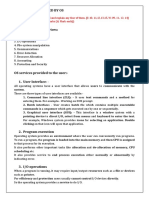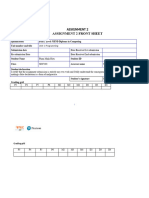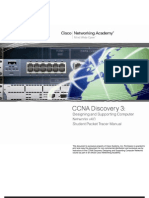0 ratings0% found this document useful (0 votes)
10 viewsLect 07 SystemCall
The document discusses how system calls allow user processes to request services from the operating system kernel. It describes how system calls provide an interface between user space programs and the kernel, and how they involve a mode switch between user and kernel mode. It also covers different parameters passing techniques for system calls and the execution flow between user programs, libraries and the kernel for system calls.
Uploaded by
usereddit6942Copyright
© © All Rights Reserved
Available Formats
Download as PDF, TXT or read online on Scribd
0 ratings0% found this document useful (0 votes)
10 viewsLect 07 SystemCall
The document discusses how system calls allow user processes to request services from the operating system kernel. It describes how system calls provide an interface between user space programs and the kernel, and how they involve a mode switch between user and kernel mode. It also covers different parameters passing techniques for system calls and the execution flow between user programs, libraries and the kernel for system calls.
Uploaded by
usereddit6942Copyright
© © All Rights Reserved
Available Formats
Download as PDF, TXT or read online on Scribd
You are on page 1/ 19
OPERATING SYSTEMS CS F372
BIJU K RAVEENDRAN & TEAM
LECT #07: SYSTEM CALLS
How to Communicate
• How to communicate between two modes?
– System calls have always been the means through which
user space programs can access kernel services. (Typically
written in a high-level language (C or C++)
– System call is the only legal entry point to the kernel
– System call provides an abstract hardware interface for
user space
• Application need not worry about type of disk, media and file
system in use
– System call ensures system stability and security.
– Kernel can keep track of application’s activity
January 23, 2024 Biju K Raveendran @ BITS Pilani Goa 2
System calls
• System call – the method used by a process to request
action by the operating system
– provide the interface between a running program
and the operating system
– It is the mechanism used by an application program
to request service from the operating system
– Often use a special machine code instruction (trap)
which causes the processor to transfer control to a
specific location in the interrupt vector (kernel code)
– Usually takes the form of a trap to a specific location
in the interrupt vector
January 23, 2024 Biju K Raveendran @ BITS Pilani Goa 3
System calls
• The process fills the registers with the appropriate
values and calls a special instruction which jumps to
a previously defined location in the kernel
– Under Intel CPUs, this is done by means of interrupt 0x80
• Control passes through the interrupt vector to a
service routine in the OS, and the mode bit is set to
monitor mode
• The monitor mode verifies that the parameters are
correct and legal, executes the request, and returns
control to the instruction following the system call
January 23, 2024 Biju K Raveendran @ BITS Pilani Goa 4
System call
January 23, 2024 Biju K Raveendran @ BITS Pilani Goa 5
System call
January 23, 2024 Biju K Raveendran @ BITS Pilani Goa 6
System calls
• Most of the system calls require one or more
parameter to be passed to them
– Parameters are stored in registers EBX, ECX,
EDX, ESI and EDI (if the parameters are less
than six)
– If number of parameters are more than five
(very rare) a single register is used to hold a
pointer to user space where all parameters
exist
January 23, 2024 Biju K Raveendran @ BITS Pilani Goa 7
System call Parameter Passing
• Three general methods used to pass parameters to the
OS
– Simplest: pass the parameters in registers
• In some cases, may be more parameters than registers
– Parameters stored in a block, or table, in memory,
and address of block passed as a parameter in a
register
• This approach is taken by Linux and Solaris
– Parameters placed, or pushed, onto the stack by the
program and popped off the stack by the operating
system
– Block and stack methods do not limit the number or
length of parameters being passed
January 23, 2024 Biju K Raveendran @ BITS Pilani Goa 8
Passing Parameter via Table
January 23, 2024 Biju K Raveendran @ BITS Pilani Goa 9
fscanf system call execution
Call to read()
read() in C program read() in the C library
read system call
January 23, 2024 Biju K Raveendran @ BITS Pilani Goa 10
Invoking System call handler & executing it
call read() read() wrapper system_call() sys_read()
Application C library System call handler sys_read()
read() wrapper
User Space Kernel Space
January 23, 2024 Biju K Raveendran @ BITS Pilani Goa 11
January 23, 2024 Biju K Raveendran @ BITS Pilani Goa 12
System call
/usr/src/linux-5.19.8/arch/x86/entry/syscalls/syscall_64.tbl
/usr/src/linux-5.19.8/include/asm-generic/syscalls.h
/usr/src/linux-5.19.8/include/linux/syscalls.h
• Each arrow in the figure represents a jump in CPU
instruction flow, and each jump may require flushing
the prefetch queue and possibly a “cache miss” event.
• Transitions between user and kernel space are
especially important(Mode switch), as they are the
most expensive in processing time and prefetch
behavior.
January 23, 2024 Biju K Raveendran @ BITS Pilani Goa 13
New System calls – Design Considerations
• What is the purpose of new system call?
– If possible it should have only one purpose
• What are the new system call’s arguments, return value and
error codes?
• Is it portable and robust?
• Verifying system call parameters
– Ensure it is valid and legal
• Important to check the validity of pointers a user gives
• Before following a pointer into user space, the system must ensure
– The pointer points to a region of memory in user space
– The pointer points to a region of memory in the process’s address space
– If reading, memory is marked readable. If writing memory is marked
writable.
January 23, 2024 Biju K Raveendran @ BITS Pilani Goa 14
Diff between system call & function call
• System call typically accessed via function calls.
• System call involves mode switching (from user to
kernel and back) where as function call does not.
• Takes much longer time than function calls.
• Avoiding excessive system calls might be a wise
strategy for programs that need to be tightly
optimized.
• Most of the system calls return a value (error if
failed) where as it is not necessary for subroutine.
• If an error (return value –1) use perror (“Message”)
to print the error.
January 23, 2024 Biju K Raveendran @ BITS Pilani Goa 15
Pros and Cons of System calls
• Pros
– Simple to implement and easy to use
– In Linux it is very fast
• Cons
– Need a system call number, which needs to be officially
assigned to you during the developmental kernel series.
– Once stabilized, the interface can not change with out breaking
user space application
– Each architecture needs to separately register the system call
and support it.
– For simple exchanges of information, a system call is overkill
(overheads because of cache miss and context switch)
January 23, 2024 Biju K Raveendran @ BITS Pilani Goa 16
Types of System calls
• Process control
– fork, wait, waitpid, execl, execlp, execv, execvp, exit,
signal, kill, alarm, pause, getpid, getppid, nice
• File management
– creat, open, close, unlink, read, write, lseek
• Inter Process Communications
– Pipe - popen, pclose, pipe, dup, mkfifo, mknod
– Message Queues - msgctl, msgget, msgsnd, msgrcv
– Shared Memory - shmat, shmctl, shmdt, shmget
January 23, 2024 Biju K Raveendran @ BITS Pilani Goa 17
Examples of Windows System calls
January 23, 2024 Biju K Raveendran @ BITS Pilani Goa 18
System call Information
• Information about system calls and library
routines
– man 2 read (if read is a system call)
– man 3 read (if read is a library routine)
January 23, 2024 Biju K Raveendran @ BITS Pilani Goa 19
You might also like
- UNIT 1 Part 5 User Interface and System CallsNo ratings yetUNIT 1 Part 5 User Interface and System Calls15 pages
- Shadan Womens College of Engineering & Technology: Topic Presented byNo ratings yetShadan Womens College of Engineering & Technology: Topic Presented by15 pages
- WWW Javatpoint Com System Calls in Operating SystemNo ratings yetWWW Javatpoint Com System Calls in Operating System9 pages
- ECE 222 System Programming Concepts Lecture Notes - System CallsNo ratings yetECE 222 System Programming Concepts Lecture Notes - System Calls3 pages
- Lecture 04 AV-323 Operating System Services User Interface and System CallsNo ratings yetLecture 04 AV-323 Operating System Services User Interface and System Calls29 pages
- What Are System Calls in Operating SystemNo ratings yetWhat Are System Calls in Operating System7 pages
- System Call Programming & Debugging: Week 7No ratings yetSystem Call Programming & Debugging: Week 718 pages
- Chapter 2: System Structures: Silberschatz, Galvin and Gagne ©2013 Operating System Concepts - 9 EditionNo ratings yetChapter 2: System Structures: Silberschatz, Galvin and Gagne ©2013 Operating System Concepts - 9 Edition64 pages
- Mastering the Art of Unix Programming: Unraveling the Secrets of Expert-Level ProgrammingFrom EverandMastering the Art of Unix Programming: Unraveling the Secrets of Expert-Level ProgrammingNo ratings yet
- TungDT BH02089 AssignmentII Programming st2No ratings yetTungDT BH02089 AssignmentII Programming st262 pages
- Special Report: Biometrics in HealthcareNo ratings yetSpecial Report: Biometrics in Healthcare19 pages
- Leveled Problem Solving Least Common Multiple: LessonNo ratings yetLeveled Problem Solving Least Common Multiple: Lesson1 page
- Sap Basis Consultant: Mobile - +91 9160790349No ratings yetSap Basis Consultant: Mobile - +91 91607903494 pages
- NSA: Learning From The Enemy, GUNMAN ProjectNo ratings yetNSA: Learning From The Enemy, GUNMAN Project29 pages
- About Me Educational Backgrounds: Bachelor Degree in Mechanical EngineeringNo ratings yetAbout Me Educational Backgrounds: Bachelor Degree in Mechanical Engineering2 pages
- System Design - Quote Generator Powerpoint - January 2013No ratings yetSystem Design - Quote Generator Powerpoint - January 201322 pages
- Gilian 3500 Air Sampling Pump: Operation ManualNo ratings yetGilian 3500 Air Sampling Pump: Operation Manual35 pages
- Fish Fin Turbine - CruzNasolOpallaRaguroTagle - Updated Paper 1 2 1No ratings yetFish Fin Turbine - CruzNasolOpallaRaguroTagle - Updated Paper 1 2 167 pages
- Heritage Institute of Technology: KolkataNo ratings yetHeritage Institute of Technology: Kolkata6 pages
- CT3223-07 New Brilliance 64-channel DMS Module ClassificationNo ratings yetCT3223-07 New Brilliance 64-channel DMS Module Classification4 pages
- Shadan Womens College of Engineering & Technology: Topic Presented byShadan Womens College of Engineering & Technology: Topic Presented by
- WWW Javatpoint Com System Calls in Operating SystemWWW Javatpoint Com System Calls in Operating System
- ECE 222 System Programming Concepts Lecture Notes - System CallsECE 222 System Programming Concepts Lecture Notes - System Calls
- Lecture 04 AV-323 Operating System Services User Interface and System CallsLecture 04 AV-323 Operating System Services User Interface and System Calls
- Chapter 2: System Structures: Silberschatz, Galvin and Gagne ©2013 Operating System Concepts - 9 EditionChapter 2: System Structures: Silberschatz, Galvin and Gagne ©2013 Operating System Concepts - 9 Edition
- Mastering the Art of Unix Programming: Unraveling the Secrets of Expert-Level ProgrammingFrom EverandMastering the Art of Unix Programming: Unraveling the Secrets of Expert-Level Programming
- Leveled Problem Solving Least Common Multiple: LessonLeveled Problem Solving Least Common Multiple: Lesson
- About Me Educational Backgrounds: Bachelor Degree in Mechanical EngineeringAbout Me Educational Backgrounds: Bachelor Degree in Mechanical Engineering
- System Design - Quote Generator Powerpoint - January 2013System Design - Quote Generator Powerpoint - January 2013
- Fish Fin Turbine - CruzNasolOpallaRaguroTagle - Updated Paper 1 2 1Fish Fin Turbine - CruzNasolOpallaRaguroTagle - Updated Paper 1 2 1
- CT3223-07 New Brilliance 64-channel DMS Module ClassificationCT3223-07 New Brilliance 64-channel DMS Module Classification

























































































